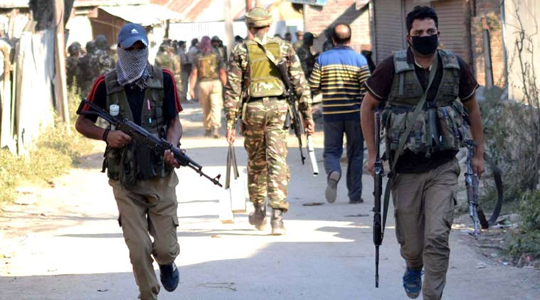Srinagar/New Delhi, Apr 13: Kashmir remained tense today as one more youth was killed in fresh clashes between protesters and security forces in the Valley amid curfew-like restrictions imposed in view of the disquiet following the death of three civilians in firing by Army yesterday.
An Assistant Sub-Inspector of Jammu and Kashmir Police was today suspended for "mishandling" of the law and order situation in north Kashmir's Handwara town where two youth and a woman were killed and four injured in firing by Army yesterday after allegations that a girl was molested by some soldiers.
Chief Minister Mehbooba Mufti, who is in Delhi on her maiden visit after assuming the charge, raised the matter with Defence Minister Manohar Parrikar who assured her that a probe will be conducted and the culprits punished.
Describing the firing incident as "very unfortunate", she said, "Such incidents should not happen in the future."
She said the families of the victims will be compensated. Northern Army Commander Lt General D S Hooda visited the affected area in Handwara and pushed for early completion of probe into the killing of three civilians yesterday. He termed the incident as "highly regrettable".
Meanwhile, one more youth was killed when security forces fired teargas shells to quell protesters, raising to four the toll in the clashes between protesters and security forces since yesterday.
The youth, identified as Jehangir Ahmad Wani, died after being hit by a teargas shell in the head during protests in Drugmulla, about 95 kms from here, over yesterday's deaths.
Wani was taken to a hospital, where doctors declared him brought dead, a police official said. Two others were injured in clashes with security forces.
A woman Raja Begum (55) who was injured in the firing yesterday, succumbed at a hospital this morning, making the death toll in yesterday's clashes three.
Protests were today reported from a number of other places as well even as authorities imposed curfew-like restrictions in six police station areas of Srinagar city and Handwara area of Kupwara in north Kashmir, a police official said.
He said restrictions were imposed in Rainawari, Maharajgunj, Nowhatta, Khanyar, Safakadal and Maisuma police station areas of Srinagar as a precautionary measure in view of apprehensions of law and order problems.
However, the official said, in view of Baisakhi festival, movement of members of Sikh community was allowed.
Separatist groups had also called for a strike against the killings as a result of which most of the shops, business establishments and petrol pumps were shut in areas other than those were restrictions have been imposed.






Comments
Add new comment